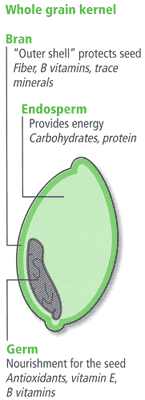Dietary fiber
Dietary fiber is the "remnants of plant cell walls that are resistant to digestion by the alimentary enzymes of man. It comprises various polysaccharides and lignins."[1]
Classification
Soluble fiber
Soluble fiber is viscous. It is in oats, oat ß-glucan, psyllium (ispaghula), barley, soybeans, dried beans and peas, and citrus.[2] Soluble fiber may affect cholesterol absorption more than insoluble fiber does.[3]
Insoluble fiber
Insoluble fiber is not viscous. Insoluble fiber may bind water and thus reduces transit time in the colon. It is in whole wheat and many vegetables.[2]
Medical uses
Consuming dietary fiber, especially the bran, may reduce the risk of diabetes mellitus type 2.[4]
Consuming dietary fiber may reduce the risk of colorectal cancer, especially in men.[5][6] However, this association is not consistent and not confirmed.[7]
Consuming fiber, especially soluble fiber[8][9] with psyllium being better than bran[10], may treat irritable bowel syndrome[11], chronic constipation[12], and hypercholesterolemia[13].
References
- ↑ Anonymous (2025), Dietary fiber (English). Medical Subject Headings. U.S. National Library of Medicine.
- ↑ 2.0 2.1 Nutrition Fact Sheet: Dietary Fiber, Nutrition, Feinberg School of Medicine.
- ↑ Whole Grains and Fiber (English). Retrieved on 2010-06-01.
- ↑ de Munter JS, Hu FB, Spiegelman D, Franz M, van Dam RM (August 2007). "Whole grain, bran, and germ intake and risk of type 2 diabetes: a prospective cohort study and systematic review". PLoS Med. 4 (8): e261. DOI:10.1371/journal.pmed.0040261. PMID 17760498. Research Blogging.
- ↑ Nomura AM, Hankin JH, Henderson BE, et al (September 2007). "Dietary fiber and colorectal cancer risk: the multiethnic cohort study". Cancer Causes Control 18 (7): 753–64. DOI:10.1007/s10552-007-9018-4. PMID 17557210. Research Blogging.
- ↑ Jacobs ET, Lanza E, Alberts DS, et al (February 2006). "Fiber, sex, and colorectal adenoma: results of a pooled analysis". Am. J. Clin. Nutr. 83 (2): 343–9. PMID 16469993. [e]
- ↑ Park Y, Hunter DJ, Spiegelman D, et al (December 2005). "Dietary fiber intake and risk of colorectal cancer: a pooled analysis of prospective cohort studies". JAMA 294 (22): 2849–57. DOI:10.1001/jama.294.22.2849. PMID 16352792. Research Blogging.
- ↑ Moayyedi P, Quigley EM, Lacy BE, Lembo AJ, Saito YA, Schiller LR et al. (2014). "The Effect of Fiber Supplementation on Irritable Bowel Syndrome: A Systematic Review and Meta-analysis.". Am J Gastroenterol. DOI:10.1038/ajg.2014.195. PMID 25070054. Research Blogging.
- ↑ Bijkerk CJ, Muris JW, Knottnerus JA, Hoes AW, de Wit NJ (February 2004). "Systematic review: the role of different types of fibre in the treatment of irritable bowel syndrome". Aliment. Pharmacol. Ther. 19 (3): 245–51. PMID 14984370. [e]
- ↑ (2008) Brit Med J. PMID 19008265
- ↑ Mertz HR (November 2003). "Irritable bowel syndrome". N. Engl. J. Med. 349 (22): 2136–46. DOI:10.1056/NEJMra035579. PMID 14645642. Research Blogging.
- ↑ Lembo A, Camilleri M (October 2003). "Chronic constipation". N. Engl. J. Med. 349 (14): 1360–8. DOI:10.1056/NEJMra020995. PMID 14523145. Research Blogging.
- ↑ Jenkins DJ, Kendall CW, Marchie A (May 2005). "Diet and cholesterol reduction". Ann. Intern. Med. 142 (9): 793–5. PMID 15867412. [e]
